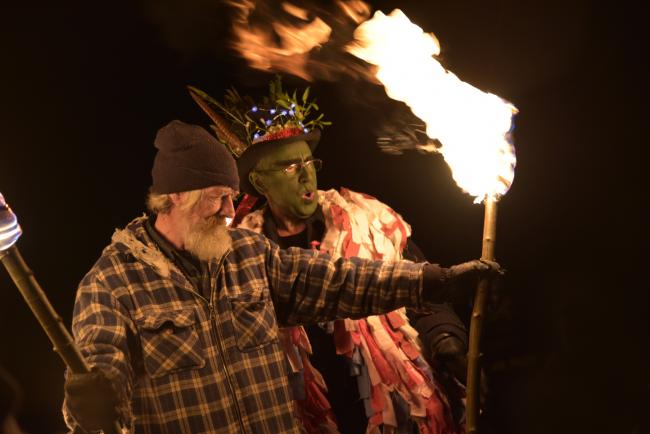TCTOP – Wassail!
Wassail all over the town!

Gloucestershire wassail songs and memories
A Wissal A Wassail sung by Charley Williams
1 Charley Williams remembers the Wassailing songs in Brockweir and Bream
2 Charley Williams remembers the Wassailing songs in Brockweir and Bream
3 Charley Williams remembers the Wassailing songs in Brockweir and Bream
Charley was born in Brockweir in the Forest of Dean in 1909. He recalled that Wassailing was common around Brockweir sixty years ago, but thinks that the First World War may have ended the tradition.
Bob Patten interviewed Charley in 1977 about his memories of the wassail traditions in the area. The recording is now held by the British Library.
WORCESTERSHIRE CUSTOMS
In Evesham on 21st December, St Thomas Day, locals recall that people would go door to door asking for food, drink or money to help them through the Christmas period.
They would sing this rhyme as they went…
A wissal, a wassal about the town:
Got any apples, throw them down.
Jug’s white, ale’s brown;
This is the best house in the town.
Holly and ivy and mistletoe bough,
Give me an apple and let me go.
Up the ladder and down the wall,
Up the stocking and down the show.
Got no apples, money’ll do;
Got no money, God bless you.
What is Wassail?
So important were the cider orchards to the local economy that many traditions arose to ensure good growth, the most famous being the Wassail.
This folk ceremony was usually carried out on Twelfth Night, which falls on 5 or 6 January in the ‘New’ calendar and 17 January in the ‘Old’ year. It involves cider, song, dance, fire and the discharge of shotguns into the fruit tree branches ‘to scare off evil spirits’.
Wassailers, wearing mistletoe and bearing fiery torches, chose the best apple tree and placed a cider-soaked cake in the fork of the tree. Then they dipped a few branches in the cider pail, and poured the drink on the tree’s roots to ‘give back’ strength for the coming year’s growth.
Our Herefordshire project partner, the Colwall Orchard Group, holds an annual Wassail. This film gives an excellent idea of goings on!
“The wassail is a firm favourite in the village calendar and we wassail whatever the weather – our first wassail was held in gale-force wind and rain, and our most memorable was in deep sparkly snow on a still moonlit night. The audience is encouraged to participate with whooping, hollering and shouts of Waes Hael and bashing of pans and whistling to make lots of noise to drive away evil spirits. After the ceremony, there is food and drink and our wassailing choir lead us in songs around the bonfire.”
Colwall Orchard Group
Tenbury Wassailing in the 19th century
In the 1870s Edwin Lees, a Worcester-born botanist and antiquarian, described the wassail tradition in the Teme Valley:
To an elevated wheat field, there twelve small fires were lighted, and a large one in the centre, these fires generally… considered representative of our Saviour and the twelve apostles, though in some places they have the vulgar appellation of Old Meg and her daughters.
Jugs of prime cider having been brought, healths are joyously drunk with abundant hurrahing from a circle formed round a central fire. The party afterwards adjourn to an orchard, and there encircling one of the best trees, and not forgetting cider, sprinkle the tree, while one of the party carols forth the following verse:
Here’s to thee, old apple tree.
Whence thou may’st bud, and whence thou may’st blow,
And whence thou may’st bear apples enow.
Hats full and caps full,
Bushels full and sacks full,
And my pockets full too.
A chorus of obstreperous huzzahs follows…, and the whole party then return to the farmhouse, where a bountiful supper with libations of cider, the result of former wassailing, awaits them. That this observance is not yet given up in some secluded place is evident from what I have heard of an old farmer, who stated to a visitor that his neglect of wassailing one year caused the failure of his crop of apples.
Edwin Lees’ account, reproduced in
The Folklore of Worcestershire, Roy Palmer (Logaston, 2005)
How long did this tradition last?
Jim Froggatt and David Spilsbury can remember farming near Rochford in the 1930s, so we asked them about how long the tradition lasted in the area. Neither Jim nor David could recall hearing of a wassail taking place or anything like it. We assume that wassailing must have fallen out of practice in this area just after the Great War, if not before.
These days, local groups are keen to revive the traditions and wassailing may yet return to the Teme Valley…
